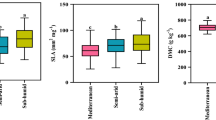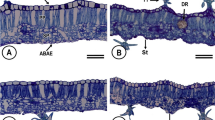Abstract
INDIVIDUAL plants of the amphibious buttercup species Ranunculus flabellaris Raf. are known to produce leaves of differing morphologies in response to differing environments. Leaves produced in the aquatic phase are highly dissected, while terrestrially produced leaves are less dissected or simply trilobed. Bostrack and Millington1 have demonstrated that of the environmental variables to which the plants are normally exposed, changes in temperature produce the greatest changes in leaf morphology. An increase in leaf dissection occurs with a decrease in temperature. Similar observations have been made by Bauer2 and Fisher3 in taxonomically diverse aquatic and terrestrial species of Ranunculus.
This is a preview of subscription content, access via your institution
Access options
Subscribe to this journal
Receive 51 print issues and online access
$199.00 per year
only $3.90 per issue
Buy this article
- Purchase on Springer Link
- Instant access to full article PDF
Prices may be subject to local taxes which are calculated during checkout
Similar content being viewed by others
References
Bostrack, J., and Millington, W., Bull. Torrey Bot. Club, 89, 1 (1962).
Bauer, L., Planta, 40, 515 (1952).
Fisher, F., Nature, 173, 406 (1954).
Author information
Authors and Affiliations
Rights and permissions
About this article
Cite this article
JOHNSON, M. Temperature Dependent Leaf Morphogenesis in Ranunculus flabellaris. Nature 214, 1354–1355 (1967). https://doi.org/10.1038/2141354a0
Issue Date:
DOI: https://doi.org/10.1038/2141354a0
This article is cited by
-
Establishment of an Agrobacterium mediated transformation protocol for the detection of cytokinin in the heterophyllous plant Hygrophila difformis (Acanthaceae)
Plant Cell Reports (2020)
-
Water-Wisteria as an ideal plant to study heterophylly in higher aquatic plants
Plant Cell Reports (2017)
-
Dramatic changes in leaf development of the native Capsicum chinense from the Seychelles at temperatures below 24°C
Journal of Plant Research (2009)
-
Temperature-dependent changes of cell shape during heterophyllous leaf formation in Ludwigia arcuata (Onagraceae)
Planta (2008)
Comments
By submitting a comment you agree to abide by our Terms and Community Guidelines. If you find something abusive or that does not comply with our terms or guidelines please flag it as inappropriate.



